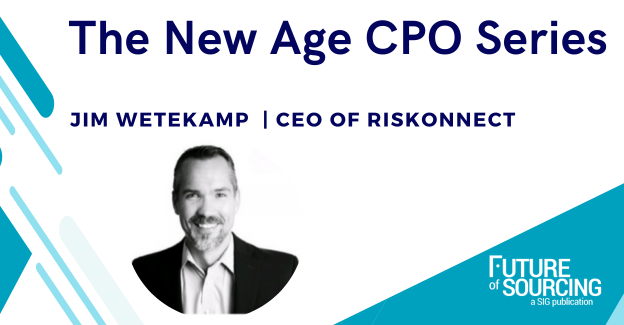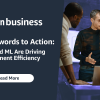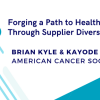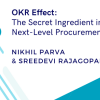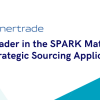In this series, Future of Sourcing is talking to practitioners, technologists and executives to get their insights and expertise on navigating current and future challenges impacting sourcing, procurement, risk and supply chain professionals. After the past two years, there’s a lot that we can learn from each other.
1. As the CEO of Riskonnect, can you speak to your company’s broader ESG and risk management efforts and any outcomes you’ve seen from these initiatives?
As a software company, our supply chain is fairly small. We regularly look for ways to reduce the environmental impact of our facilities, computer hardware, and cloud infrastructure hosting services. We encourage employees to minimize travel and leverage virtual meeting tools wherever possible.
Our technology helps customers reduce their own footprint. We are an integrated suite platform provider that enables customers to consolidate their use of multiple cloud platforms, minimize the need for on-premises hardware systems, and bring all aspects of risk under one roof.
We also take social matters seriously. We closely review the socio-political impact of countries where Riskonnect team members are based. We prioritize diversity recruitment, develop outreach programs in partnership with local colleges and universities, and provide global training programs that do deep dives into culture and sensitivity bias.
Riskonnect team members and our hosting infrastructure vendors are intentionally spread across selected locations in several different geographies, which diversifies our business input risks. We choose to work with third parties and partners whose values align with our own. This primes us for success as ESG and third-party risk become even more integral to an all-encompassing risk management strategy.
In 2023, Riskonnect joined the United Nations Global Compact initiative. This global network of over 15,000 companies and 3,800 nonbusiness signatories is committed to driving responsible business practices and building a sustainable future. As a member of the network, Riskonnect will be responsible for publishing an annual “communication on progress” that demonstrates our efforts to align operations and strategies with the ten universally accepted principles in the areas of human rights, labor, environment, and anticorruption that are at the center of the UN Global Compact’s mission.
2. What new and exciting ESG initiatives are your team working on?
One of Riskonnect’s core values is community. We’ve turned this into action through a variety of global and local charity initiatives that enable our team members to volunteer and monetarily give back to the communities in which we live and work.
Talent and culture are key aspects of our ESG approach. We are committed to providing our employees with an engaging and rewarding place to work where they can grow and develop. We actively work with employees on their career paths and identify new opportunities within their own functions and across departments. We are also intentional about offering learning tracks on a variety of broader personal topics from financial planning and product bootcamps to nutrition, fitness, and wellness.
Diversity, equity, and inclusion is foundational to a strong company culture. We’ve launched education programs that focus on addressing racial inequality, human rights, and underserved communities globally. We also encourage and support employee-led groups. A great example is WITKonnect, which stands for Women in Technology. Launched in March of 2021, the group hosts outside speakers and discussion groups to further the career development of women in the field.
3. How do you think the industry will continue to evolve in 2023 regarding new technologies, labor issues, and sustainability?
Stakeholder awareness and demand for ESG transparency will continue to grow. Sustainability and diversity are already key product selection criteria for customers and that choice will become more evident next year. Sixty-seven percent of employees say they’re more willing to apply for positions with environmentally sustainable companies, which indicates ESG will continue to be a key talent driver. At the same time, ESG regulations are gaining momentum with the Security and Exchange Commissions (SEC)’s new climate disclosure requirements and similar legislation globally. These requirements up the stakes for companies to proactively manage their ESG risks and be more transparent through ESG reporting.
The specific requirements and timelines of these regulations will likely be clearer next year.
Businesses will need to think critically and realistically about any sustainability claims they make and consistently benchmark, track, and report on their ESG performance to demonstrate progress. If a company is found to have not worked towards or fulfilled their commitments, they could face compliance issues, public backlash, and reputational risks, which would have a major impact on the bottom line.
Organizations will also likely speed the adoption of technology to help them reduce risk and build resilience ahead of the anticipated economic downturn. One of the best times to invest in technology is during a period of uncertainty. The right tools and systems can help you successfully navigate through a crisis because you’re better positioned to lower risks to critical business operations, respond to disruptions that arise, and drive efficiencies.
4. What are the most pressing issues facing you, your team, and the industry as a whole?
An economic downturn is top of mind for every business. Supply-chain disruptions, inflation, evolving regulations, the ongoing talent crunch, and more will also continue to test companies’ resilience. As the pressure to perform and operate with fewer resources grows, organizations will need to refocus on what is most essential for their success and how they can apply their resources most effectively. The ‘year of the essential’ will be a universal theme for organizations in 2023.
There are a variety of areas in which you can spend your time as an organization. Which activities are the most critical for keeping your business running? Where can you cut out nonstrategic work so that your team can focus on the highest value initiatives? Understanding which processes and initiatives are most important for keeping the lights on, and which are nice to have, is the first step in building resilience.
Supply-chain performance is a key component of business continuity and resilience. Identify where disruption is most likely to occur across your value chain, how that would impact your critical business services and products, your tolerance for disruption in those areas, and time to recovery. Map suppliers and products to cash flow so you have a clear sense of which supply partners are most strategic to your organization. Put controls in place – inventory stockpiles, dual source strategies, redistribution of your supplier base – to ensure supply-chain continuity and reduce the likelihood of business interruptions.
5. How are you solving these issues?
The organizations that haven’t taken a rigorous approach to mapping their critical business services most often rely on informal plans, static information within spreadsheets and PDFs, and fragmented risk management strategies. This approach leads to inaction. We help solve this issue by automating and integrating companies’ business continuity programs into daily operations. Organizations can create a digital model of their operations to understand the impact of disruptions on important business services and their overall vulnerabilities, dependencies, and obligations. Companies can also stress test their response plans, identify any gaps in their recovery methods, and be ready to act if a disruption hits their business.
6. What resources and knowledge do industry professionals need to have now that weren’t needed pre-pandemic?
The past few years have brought a variety of new challenges that supply chain, procurement, and risk professionals have had to handle all at once. As practitioners grapple with the impacts of inflation, new regulations, supply-chain disruptions, geopolitical events, and more next year, having a well-rounded skill set will be even more important.
Think about where you can deepen your financial knowledge and understanding of the global economy. This expertise will boost your ability to effectively address the impacts of inflation and economic risks. How can you sharpen your understanding of current and emerging regulations so you can ensure compliance? Where can you improve your analytical skills so you can accurately interpret data and help your organization respond effectively to risks and disruptions?
All of these skills will be instrumental to professionals’ success next year as the industry continues to face a confluence of risks. Consider where you can invest in tools and systems to automate core and tedious processes. The capacity gains will enable you to focus on your skills development and on driving value for the organization.
Region:


